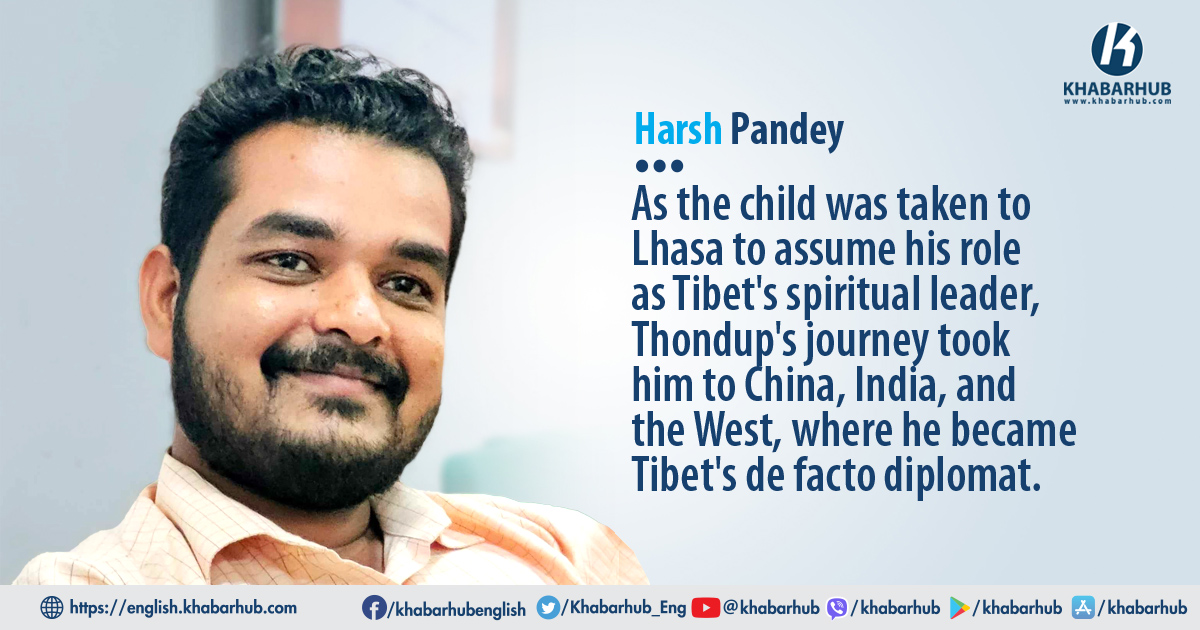“We die with the dying: See, they depart, and we go with them. We are born with the dead: See, they return, and bring us with them.”
These lines by T S Eliot resonate in my mind while writing about Gyalo Thodnup. The passing of the elder brother of Dalai Lama marks the end of an era in Tibet’s history.
Unlike Dalai Lama, who has been at the forefront of Tibet’s struggle, Thondup’s life was marked by navigating the complex geopolitics of the region, making arrangements/compromises with friends and foes, and ultimately living a quiet life in the heart of the Himalayas.
His autobiography, The Noodle Maker of Kalimpong, provides a rare glimpse into the high-stakes diplomacy that shaped Tibet’s fate after China’s invasion.
It is high time to reflect on his legacy after his departure, not just as an obituary but also to shed light on the challenges of international politics and the enduring spirit of people striving for autonomy.
Perhaps the most trying moment of his diplomatic career occurred in the early 1990s when he facilitated travel for several envoys of Tibet to go to Tibet itself under Beijing’s chaperones. What they saw was tragic—a Tibet ravaged by enforced assimilation, political repression, and demographic shift.
Born in 1928 in Taktser, Amdo, Gyalo Thondup was just another ordinary Tibetan boy until destiny came knocking: his younger brother was identified as the reincarnation of the Dalai Lama.
As the child was taken to Lhasa to assume his role as Tibet’s spiritual leader, Thondup’s journey took him to China, India, and the West, where he became Tibet’s de facto diplomat.
In 1944, he was dispatched to study under the Nationalist government of Chiang Kai-shek in Nanjing, China.
Mastering Mandarin, as well as the fluid shifts of power in China, became an art form he later put to acceptable use. Yet in 1949, after Mao Zedong’s Communists had finally captured China, Thondup sensed that independence for Tibet now faced mortal peril and escaped into India.
It was there that he first encountered American intelligence officers. Already in the 1950s, he understood that Tibet needed powerful allies.
This realisation would lead to one of the most controversial aspects of his career: his involvement with the CIA.
Gyalo Thondup was one of the significant key players after the 1950 Chinese invasion of Tibet.
Through contacts in India, he arranged for a secret deal with the CIA to start secretly training Tibetan guerilla fighters in Camp Hale, Colorado.
This was referred to as ST CIRCUS, where the Tibetan fighters were parachuted back into their homeland to lead an armed insurgency against the PLA.
One of Thondup’s most significant diplomatic victories was orchestrating the Dalai Lama’s escape to India in 1959.
As the Chinese crackdown intensified in Lhasa, Thondup worked with the Indian government and American intelligence to secure a safe passage for his brother.
The escape, carried out under the cover of darkness, remains one of the most daring exfiltration in modern history.
However, the armed resistance he helped orchestrate was doomed to failure.
The CIA ended its support to Tibetan guerrillas in the early 1970s due to changes in the priorities of the United States toward developing relations with China under Nixon and Kissinger.
It abandoned the fighters after their training by Americans, leaving Thondup to pick up the pieces.
Despite his association with the armed resistance, Thondup never surrendered to diplomacy.
His most pivotal moment came when, in 1979, Chinese leader Deng Xiaoping called him to Beijing for direct dialogue.
The encounter was historic, as Deng said to Thondup, “Except independence, everything is negotiable.”
Thondup saw this as an opportunity. For the next two decades, he worked to build backchannel communications between Tibet and China despite hostility from hardliners on both sides.
Gyalo Thondup retired from active political and diplomatic life more than 30 years ago and chose to live in the quiet town of Kalimpong in West Bengal.
Some Tibetans accused him of being too conciliatory toward China, while Chinese leaders distrusted his motives.
Despite these tensions, Thondup remained convinced that Tibet’s only hope lay in negotiation, not war.
Perhaps the most trying moment of his diplomatic career occurred in the early 1990s when he facilitated travel for several envoys of Tibet to go to Tibet itself under Beijing’s chaperones. What they saw was tragic—a Tibet ravaged by enforced assimilation, political repression, and demographic shift.
The emissaries returned with sombre dispatches, and the Dalai Lama lost the last vestiges of hope that China would act in good faith.
Gyalo Thondup retired from active political and diplomatic life more than 30 years ago and chose to live in the quiet town of Kalimpong in West Bengal.
There, he ran a noodle factory, which ironically contrasted with the profiles he had held during his active political life.
Despite many controversies that surrounded him, he never stopped believing in the Tibetan cause.
He provided ample instances in his book where the naïve optimism was crushed with realpolitik and global diplomacy.
His death just before the 13th of February, which is a ceremonial Independence Day celebrated by Tibetans, questions about what is going to be the future of the civilisation, which is slowly becoming history.
(Harsh Pandey is a PhD Candidate at the School of International Studies, Jawaharlal Nehru University, New Delhi)









Comment